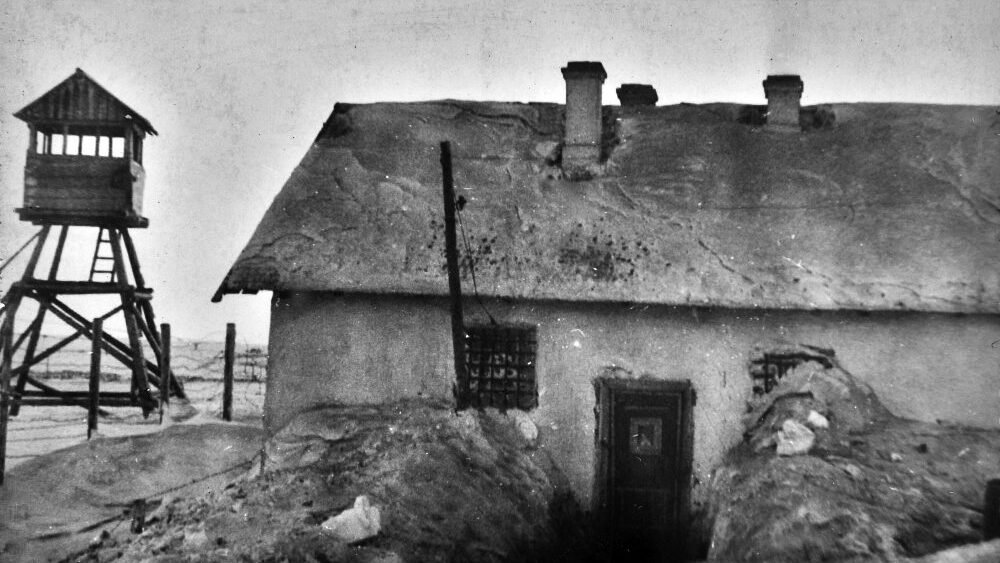
Detention cell (“penal isolator”) of a camp in the Vorkuta Region, 1945 / Russian Federation State Archive, Moscow
It would appear that during the one thousand one hundred years of Russia’s existence as a state there have been, ah, how many foul and terrible deeds! But among them was there ever so multimillioned foul a deed as this: to betray one’s own soldiers and proclaim them traitors?
Aleksandr Solzhenitsyn, The Gulag Archipelago
For centuries, Dante Alighieri’s Divine Comedy has been regarded as one of the great works of Western civilisation. As a discussion on justice, human nature, the soul, redemption, and the ultimate battle between good and evil, the poem tells the tale of the author’s dreamlike journey through Hell, Purgatory, and Heaven. During his travels through Hell, Dante finds that the ninth circle of Hell is reserved for traitors—those who had betrayed their own. This inner circle is not a fire, but a frozen wasteland, devoid of anything that might resemble love or compassion. In the very centre, Dante finds Lucifer himself, eternally gnawing on the bodies of Judas Iscariot, Brutus, and Cassius: history’s most infamous traitors. By this, Dante seeks to convey to his reader that, even though there are many evils in this world (there are multiple circles in Hell), the worst evil lies in betrayal.
One cannot help but be reminded of this frozen wasteland when reading about the great frozen wasteland of the 20th century, as described in Aleksandr Solzhenitsyn’s masterpiece, The Gulag Archipelago. In this spectacular yet terrifying book, Solzhenitsyn sheds light on a modern manifestation of Dante’s inner circle of Hell. Through painstaking detail, he recounts the extent of the atrocities committed under the Soviet Union. Unlike some of history’s most renowned oppressors, who have targeted external enemies, the Soviet regime turned against its own people. The gulags, vast networks of forced labour camps, were not just prisons, but a clear sign of an ideology consuming and exterminating those it purported to liberate.
Solzhenitsyn’s plea is not just for those in power not to commit evil. It is a caution against the danger of ideology—of allowing oneself to be consumed by a theory about how the world ought to be, when that theory is not compatible with reality and human nature.
It would be superficial to argue about whether Nazism is worse than Communism, or the other way around, and Solzhenitsyn does not attempt to do so. He does, however, point to an important difference between the behaviour of the Nazis and the Communist Soviets. Even though both had extermination camps, the Nazi camps were aimed at exterminating other nations—particularly the Jews—while the Soviet camps were aimed at exterminating its own people. As a result of involving other nations, the evil of Nazism was presented to the world stage, while the evil of Communism was largely regarded as an internal issue, making it easier for the world to turn a blind eye.
Herein lies a major, and often underappreciated reason why Communism and leftist ideology are not universally rejected to the same extent as Nazism and right-wing ideology are: left-wing atrocities are usually directed at the destruction of one’s own. Nowhere is this as physically evident as the Soviet takeover of Nazi concentration camps, only to replace the Jews with Russians.
This manifestation of betrayal and mass extermination of their own people was not only a consequence of the Russian Revolution. It is emblematic of the consequences of leftist ideology when it comes to power. The same thing happened during the French Revolution, the Chinese Revolution, and the Cuban Revolution, to name but three. It has become a recurring thread that pursuing heaven on earth through ideological conviction persistently leads, instead, to hell on earth.
In China, Mao’s ‘Three Antis’ campaign, for example, sought to eradicate ‘counter-revolutionary activity’ in the form of graft and embezzlement, profiteering and extravagance and waste. The punishment for such crimes was death. And so Mao ordered his henchmen to keep on killing Chinese citizens until at least 10,000 people were killed. To Mao, killing 10,000 of his own people would serve as evidence that the goal of eradicating these things had been achieved. This is but a small example of the kinds of atrocities committed all over the world under the banner of what is proudly presented as ‘progressive’ ideas.
The pattern of betrayal is not a mere coincidence, but the consequence of a fundamental flaw in leftist ideology. While aiming for utopian ideals of equality and justice, the implementation of policy measures veer toward oppression, with the leadership justifying the sacrifice of their own tradition, religion, or even people as necessary for the greater good. In seeking to eradicate the enemies envisaged by their ideologies, these regimes betray the very principles they claim to uphold. This is because these ideologies seek to replace the world as it is with the world as it ought to be. As a result, the pursuit of ‘progress’ is not driven by a recognition of reality, nor by a respect for human nature, but by an animosity towards both reality and human nature.
It is quite clear that much of the world took the wrong lessons from the bloodshed of the 20th century. Instead of cautioning against the danger of progressive ideology, the caution was against the danger of nationalism. The solution to the problem of nationalism is then, tragically, presented as the pursuit of progressive ideology – the very foundation of the horrors that we wish to prevent.
We would do well to rediscover Dante’s Divine Comedy and Solzhenitsyn’s Gulag Archipelago and heed their warnings about the consequences of betraying one’s own people.